This was not the Donald Trump the world is used to, a small figure in a room full of people with the authority to tell him what to do. But the image of citizen Trump, surrounded by cops, marshals and prosecutors, marked a new escalation in Trump’s long-running war with the institutions of government. With his surrender, arrest and arraignment on April 4 in a mundane hearing room on the 15th floor of Manhattan Criminal Court, Donald Trump—the real estate mogul, reality TV star, and former President of the United States—became Donald Trump, defendant. And a new, dangerous chapter of his confrontation with American norms was underway.
In indictment 71543-23, the People of the State of New York charged Trump with 34 felony counts of falsifying business records for his alleged role in hush-money payments to a porn star ahead of the 2016 election. Trump, prosecutors say, falsified those records to conceal violations of New York State election law that prohibits promoting a candidate by unlawful means and federal election law that caps contribution limits. It was the first time in history that a former or sitting President had been indicted for a crime.
During the seven years since his surprise 2016 victory—a stretch marked by two impeachments, a plot to overturn the results of a presidential election, and a violent insurrection—the sheer number of historic moments has had a numbing effect. But the spectacle of Trump’s arrest and arraignment was as uncanny as any scene he has orchestrated, contrasting the quotidian reality of the New York criminal justice system with the florid display that often accompanies the former President in the public spotlight: news helicopters trailing him across the East River, MAGA acolytes and Trump-hating protesters trading insults a stone’s throw from the courthouse, his private jet whisking him back to the safety of his Florida mansion hours later.
The bizarre atmosphere obscured a sobering reality for both Trump and the country he wants to lead again. The charges brought by Manhattan District Attorney Alvin Bragg may be mere prelude to more serious charges. Trump is at the center of at least three other significant criminal investigations. Atlanta-area prosecutors are examining Trump’s role in efforts to overturn Joe Biden’s Georgia victory in the 2020 presidential election. A special counsel appointed by U.S. Attorney General Merrick Garland is investigating Trump’s alleged mishandling of classified documents, as well as whether he unlawfully interfered with the certification of the 2020 election and the peaceful transfer of power.
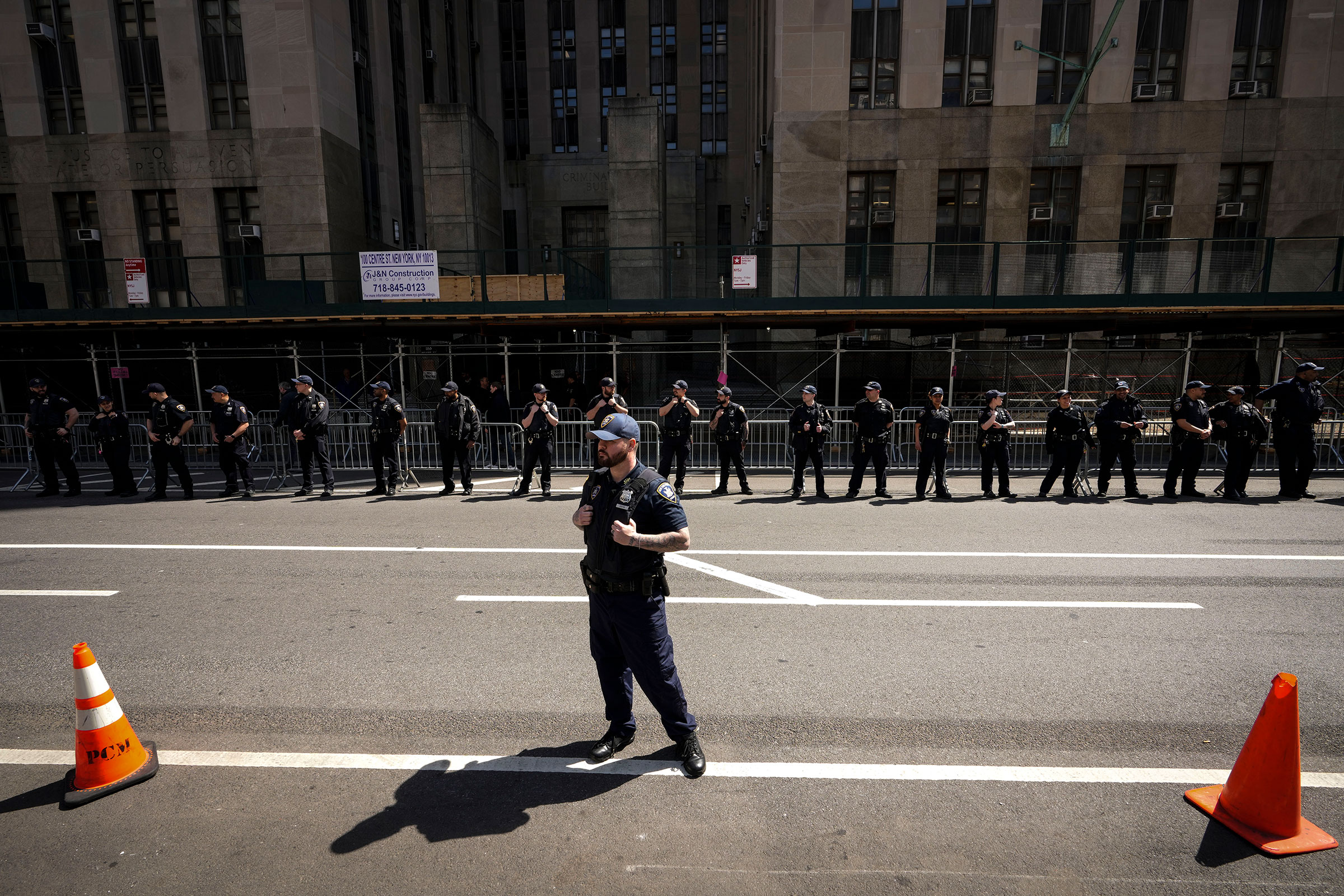
And for the rest of us? Trump is running once again for Commander in Chief and a 2024 campaign waged against the backdrop of criminal charges will be darker and more dangerous than anything Trump has authored to date. Trump once presented himself as a savior: “I alone can fix it,” he told the nation during the 2016 Republican National Convention. Now he casts himself in a new role. “I am your retribution,” he told supporters last month, before warning three weeks later of “death & destruction” should he face criminal charges. His rhetoric is likely to grow more vindictive as he constructs a campaign around the theme of comeuppance.
In this new world of legal liability and increasingly vengeful politics, it would be foolish to predict how this saga unfolds. Trump has pleaded not guilty, and some legal experts believe Bragg’s case may be difficult to prove. Other charges may never materialize. Trump allies believe the martyr’s mantle will boost him in a Republican primary, which now looks like his to lose. But polling also suggests the prospect of electing a President facing criminal charges may be anathema to the moderate voters who decide general elections.
Trump’s presidency was defined by his attempt to tame the government bureaucracy he was charged with leading. He refashioned the Republican Party into a personality cult and went to war with Washington. If it revealed anything, the Jan. 6 riot underlined Trump’s ability to incite a violent mob bent on destroying the institutions of a government that he and his most ardent supporters believe has done them wrong. As the nation limps into a third straight campaign dominated by Donald John Trump, it is on the cusp of what may be the most consequential faceoff yet between the rule of law and a politician unbound by it.
Hours before Trump made the 20-minute drive from his eponymous midtown tower to a lower Manhattan courthouse to surrender to authorities, the scene outside the building was already intensifying. Supporters and detractors stood on opposite sides of Collect Pond Park across the street, yelling at one another. One side chanted, “Four more years,” and the other side chimed in with, “in prison!” A woman in a red MAGA hat and carrying a Trader Joe’s bag tore through a banner that read, “Trump Lies All the Time.” Fabulist Rep. George Santos wandered through the crowd. Rep. Marjorie Taylor Green compared Trump to Nelson Mandela and Jesus.
Such chaotic curtain-raising scenes are typical of Trump’s time on the public stage and fit with his attempt to cast his arrest as an indicator of a larger injustice, with him standing in the breach as a messianic martyr. His indictment, he has written on his social media platform, is “political persecution and Election Interference at the highest level in history.”
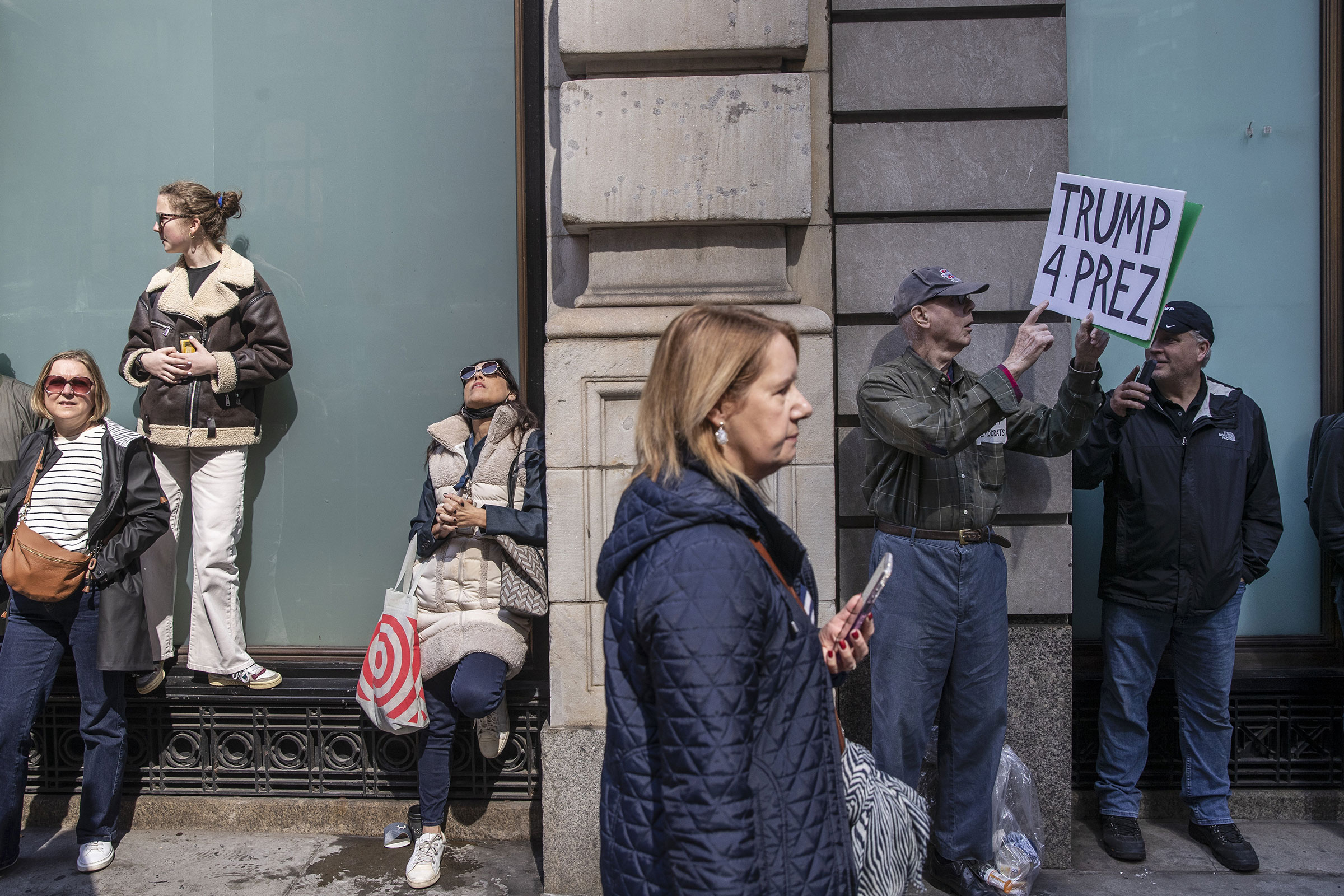
Away from the public spectacle, in a relatively staid hearing inside the courthouse, Trump pleaded not guilty to the 34 felony counts. The thrust of the charges—falsification of business records—are normally treated as misdemeanors in New York, but Bragg’s office elevated them all to Class E felonies, the lowest level under the state’s penal code, on the grounds that Trump doctored the books to conceal other crimes.
“We cannot and will not normalize serious criminal conduct,” Bragg said in a news conference shortly after the arraignment.
Read More: Your Questions About Trump’s Indictment, Answered
The case stems from Trump’s alleged role in making hush-money payments to people who had negative information on him, including porn star Stormy Daniels, who claimed to have had an affair with him. Just before the 2016 election, lawyer Michael Cohen paid $130,000 to Daniels, whose real name is Stephanie Clifford, to stop her from sharing her story. Trump, who has denied the affair, subsequently reimbursed Cohen for the payout in 11 installments, according to the indictment, but filed those disbursements as legal fees to cover up what amounted to a campaign expenditure.
Cohen has already paid a price for his role in the affair; in 2018, he was convicted of fraud, tax evasion, and campaign finance violations, and served three years in federal prison.
“We today uphold our solemn responsibility to ensure that everyone stands equal before the law,” Bragg said. “No amount of money and no amount of power changes that enduring principle.”
The court is set to reconvene in December, with the Manhattan DA’s office hoping for the trial to start by January, the thick of the Republican primary season.
Bragg’s case—as historic as it may be—may only be the start. In addition to the Manhattan indictment, Trump is facing multiple federal and state investigations. Justice Department Special Counsel Jack Smith is looking at Trump’s handling of classified documents at his Mar-a-Lago Club after he left the White House, and whether Trump obstructed efforts by federal officials to return the records to the government. Federal investigators obtained a warrant to search Trump’s office and a storage area at Mar-a-Lago in August. Smith has reportedly interviewed multiple witnesses close to Trump, and a Washington grand jury has heard evidence involving potential felony violations.
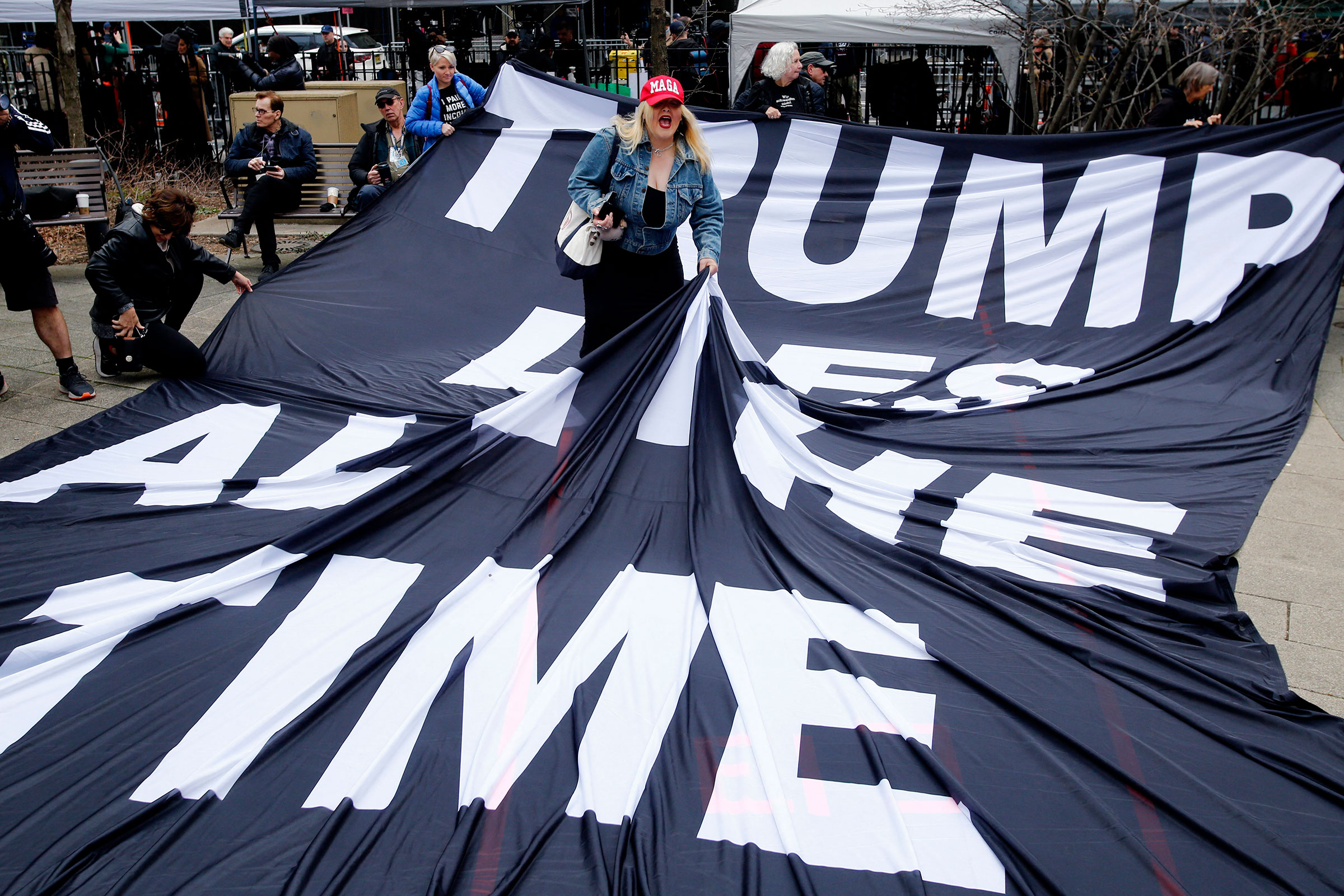
Prosecutors working under Smith are also conducting a parallel investigation into Trump’s actions to reverse the election results leading up to the deadly Jan. 6 attack. Smith’s team is reportedly looking closely at a scheme pushed by Trump and his allies to gather slates of fake electors from states Trump lost to reverse Biden’s win in the electoral count. That investigation has included subpoenas for documents from local election officials in Wisconsin and Nevada.
In Georgia, Fulton County District Attorney Fani Willis is exploring Trump’s efforts to overturn Joe Biden’s 2020 election win there, where Trump and his allies made unfounded allegations of voter fraud. On a phone call in January 2021, Trump told Georgia Secretary of State Brad Raffensperger to “find 11,780” votes to reverse Biden’s win, according to a recording of the call.
Willis has called high-profile Republicans to testify before a special grand jury, including Rudy Giuliani, Senator Lindsey Graham of South Carolina, and Georgia Governor Brian Kemp. The grand jury also heard from poll workers, technical experts and state employees. Trump himself did not testify. Willis has yet to bring any charges in the case, but in February, the special grand jury filed a report with the court that concluded some witnesses may have lied under oath.
Trump’s also facing another investigation in New York. Letitia James, the state’s attorney general, filed a lawsuit in September against Trump, as well as his company and senior managers, for alleged financial fraud. James has alleged that Trump was involved in years of misrepresenting the company’s financial position for economic gain. Her office has interviewed more than 50 witnesses in the case and collected some 1.7 million pages of documents. A trial is scheduled to start in October, but Trump’s legal team has requested a delay.
For Whit Ayres, a longtime Republican consultant, the gravity of those cases would stand to kneecap Trump far more than Bragg’s indictment.
“If I were designing a criminal charge that would be easy for Republicans to dismiss as a witch hunt,” Ayres says, “I would have designed exactly what’s at stake in the Manhattan court.”
At a conservative conference of far-right faithful in Washington early March, Trump delivered the first cut of his campaign’s rallying cry: “I am your warrior. I am your justice. And for those who have been wronged and betrayed: I am your retribution.”
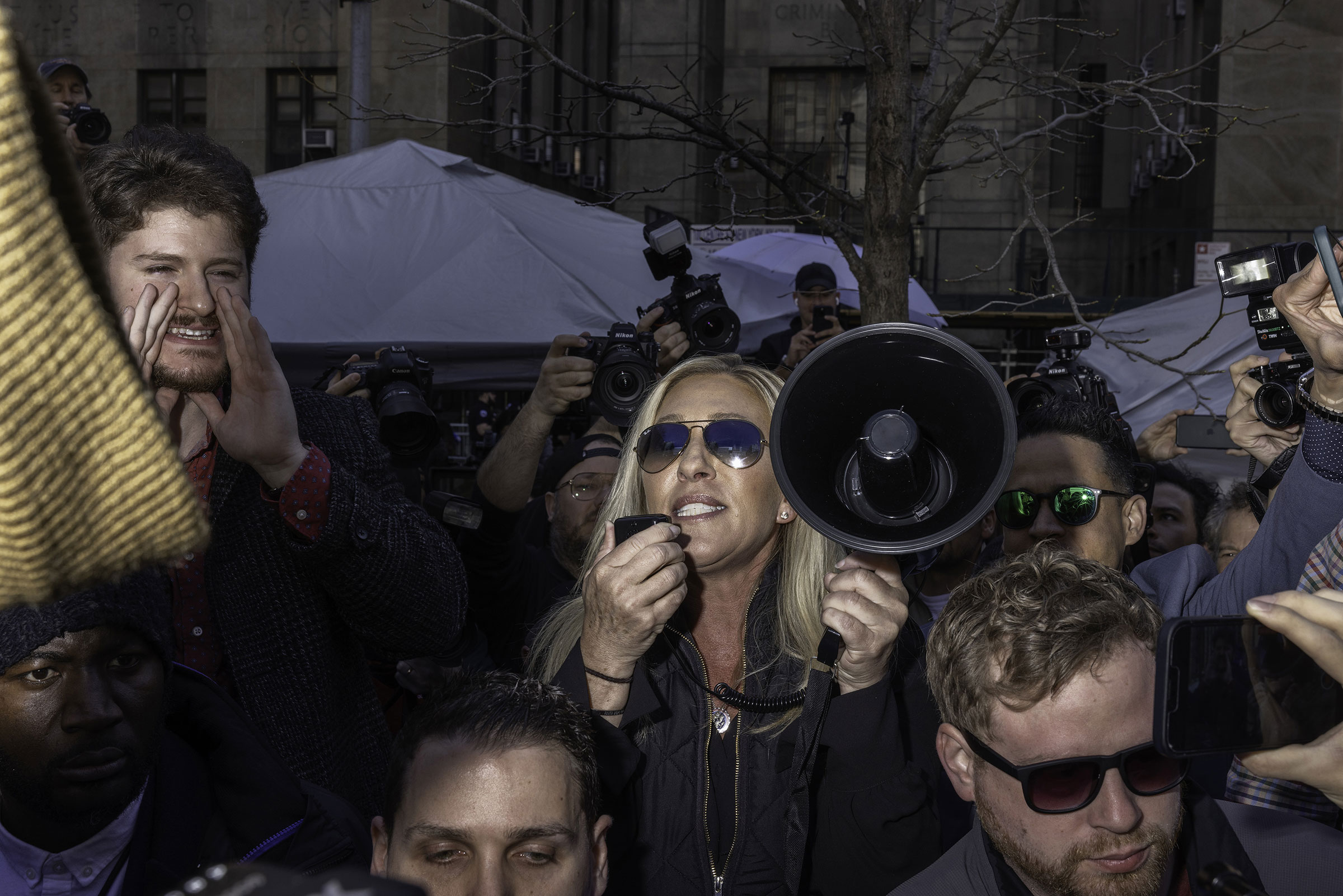
It was the latest escalation of the former president’s increasingly vengeful rhetoric. But after what may be the first of multiple criminal prosecutions against him, Trump found the target to focus his base’s anger.
Within hours of news breaking that Trump had been indicted, his fundraising machinery kicked in, blasting out emails and texts. Potential donors were offered T-shirts that read “I Stand with Trump” and warned that the “justice system has utterly collapsed.” Moments before the arraignment on Tuesday, the campaign debuted a new shirt featuring a fake black-and white-mug shot of Trump with the words “NOT GUILTY” emblazoned across it. The pitches seem to be working. The campaign raised $8 million in four days, according to Trump advisor Jason Miller.
Trump’s fury will only escalate, according to those who know him well. “I think that his rhetoric on that will be very intense,” Steve Bannon, Trump’s former White House strategist, tells TIME. “These are the American Bolsheviks, and they’re coming for Trump hard.” And Trump, Bannon adds, is likely to fashion himself as an emblem for Americans who feel they, too, are the victims of a system that has harmed them. “They will come after you now individually just like in revolutionary France, or like in the Russian Revolution.”
Whether a self-declared reactionary platform resonates beyond the MAGA echo chamber or falls flat with all but diehard Trump voters is a central question in the coming race for the White House. “It may give him a short-term bump in the Republican primary, but this is bad news for Donald Trump in his presidential race,” says Simon Rosenberg, a veteran Democratic operative who worked on Bill Clinton’s 1992 campaign. “It harms the entire Republican brand. It’s going to be very difficult for Republicans, if Trump somehow isn’t the nominee next year, for them to say, ‘Hey, no biggie.’”
The last three election cycles have produced consistent results, with MAGA Republicans suffering bruising losses. Democrats like Rosenberg believe it would mark a grave strategic error for Republicans to quadruple down. Yet polls suggest that’s what they are doing. A Yahoo News/YouGov poll of Republican- and Republican-leaning voters conducted March 30 and 31 found Trump with a 26-point lead in a hypothetical match-up against Florida Gov. Ron DeSantis, a jump of 18 points from two weeks earlier. At the same time, more and more Republicans have rushed to Trump’s defense. GOP House members are trying to force Bragg to testify on Capitol Hill. Right-wing leaders are amplifying the Trumpian line that his legal woes epitomize a deep state conspiracy to subjugate conservative Americans.
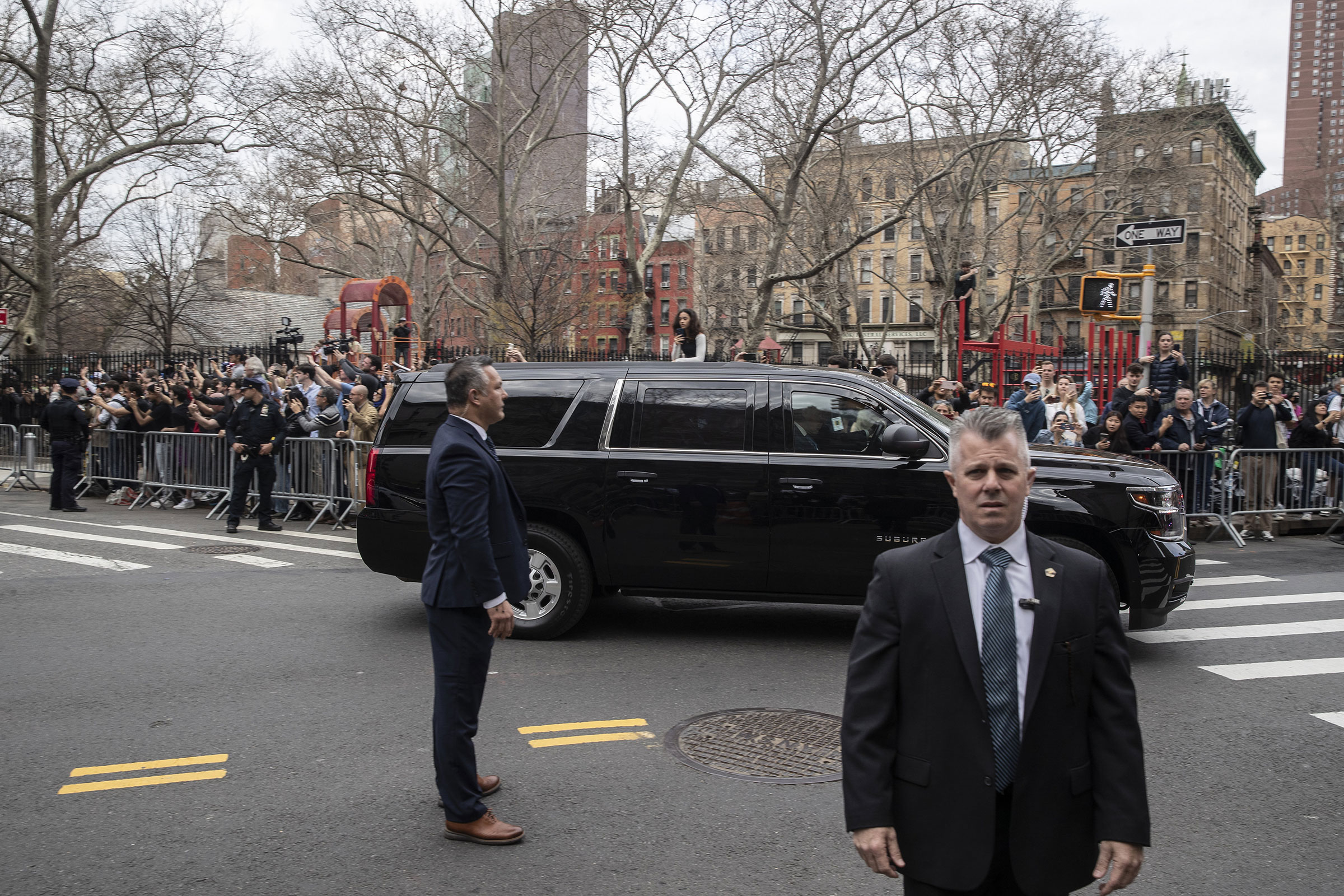
“There will be a unified front from the Republican Party behind Donald Trump. People will be forced to rally behind him,” Alex Bruesewitz, a GOP consultant and CEO of the Trump-allied firm X Strategies, tells TIME. “DeSantis’s numbers have gone down, and Republican voters are continuing to coalesce around Trump,” adds Garrett Ventry, a Republican strategist.
Equally significant is the way he’s captivated the media’s attention, after a long period in which many outlets protested giving him ubiquitous treatment. Now, he’s the beneficiary of wall-to-wall television coverage tracking his every move as stares down criminal charges. On Monday, his children and aides relished watching all the networks carry a feed of his plane—dubbed Trump Force One—traveling from Palm Beach to New York City while they were mid-air.
“He’s taken over the conversation again,” Bannon says. “The media has played right into his hands. It’s all about Trump. That’s why there can’t be any competitor on the Republican side. The media has helped him bigfoot them. That’s finished.”
The former president appears happy to harness his legal woes to gin up a sense of grievance among his base and propel himself back into power. So far, he’s finding a willing audience. “You’ve got to question why a man who has all the wealth, recognition and comfort in the world is still willing to subject himself to this crap for us,” says Pamela Menera, who was among the throng of Trump supporters standing outside the courthouse on Tuesday. “He’s doing it for us.”
Few, if any, politicians can elicit that kind of passion from their supporters, and the various prosecutors targeting Trump may provide a fresh way for him to mobilize it. “Everybody remembers that 2015 gold escalator moment,” Bruesewitz says. “Is Trump’s indictment going to be that for 2024?”
—With reporting by Sanya Mansoor and Karl Vick
More Must-Reads From TIME
- The 100 Most Influential People of 2024
- Coco Gauff Is Playing for Herself Now
- Scenes From Pro-Palestinian Encampments Across U.S. Universities
- 6 Compliments That Land Every Time
- If You're Dating Right Now , You're Brave: Column
- The AI That Could Heal a Divided Internet
- Fallout Is a Brilliant Model for the Future of Video Game Adaptations
- Want Weekly Recs on What to Watch, Read, and More? Sign Up for Worth Your Time
Contact us at letters@time.com